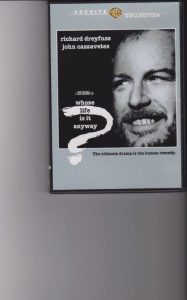(A truly great 1981 movie(and play) classic about the right-to-die controversy: very funny, serious, beautiful and moving)
“There’s a divinity that shapes our ends,”
Rough-hew them how we will.”
-Shakespeare, Hamlet
We may be or feel limited by forces outside us–be they known or unknown–as in mystery, but we generally/most of the time have choices or options, as Shakespeare’s various characters often illustrate (“The fault, dear Brutus, is not in our stars,/But in ourselves” (Julius Caesar). To a large extent–even within many/most circumstances, situations, and contexts–we have choices.
Although there was only a split second before the UPS van veered out of nowhere in front of me as I was travelling 50 km/hr. one recent summer, I did have about a second or less to react and slam on my car brakes and miraculously survive someone else’s irresponsibility/stupid/completely selfish move to ‘take me out’. There was a choice, albeit a brief, limited, limiting one.
Likewise, if you are told you may have cancer, you will likely have a series of choices–albeit difficult ones–to make in the process of your treatment. You can still “rough-hew” your limited, limiting choices in that apparently external “shaping” context. You might even say “No” or refuse treatment and choose to die on your own terms. True, as in the exceptional case of Whose Life is It Anyway? , you may find yourself in a medical or state system that has last call, or in the case of a no living will situation, be subject to others’ (often family’s) choices, but in most situations, you typically still have a choice and can call your own shots.
I use these extreme situations to point out my theme here. Otherwise, you are generally, through your life, left to make choices and decide on this or that, regardless of red tape and rules, for most of your life. As in: You chose your school, your relationships, your studies, your work, your home, your lifestyle to a large extent. No one else. You make or made your life, regardless of limiting factors (health, school or work restrictions, the limits and limitations of the people you threw your lot in with, etc.). Your life, your story is unique, your own. It was not authored and largely directed by outside forces, agencies, or mysteries.
In that, I think, a major, fundamental acceptance along the lines of what Shakespeare and Novalis wrote–character is destiny–regardless of the stars and whatever other external “divinity”.
……………………
The Existentialists did make sense when I first encountered them in the ’60s, especially with their emphasis on human choice within absurdist modern life. The lessons of Shakespeare’s characters and many other character processes from works I taught in high school English confirmed the position above. To say nothing of what I have seen and experienced in my own life and those other lives around me.

